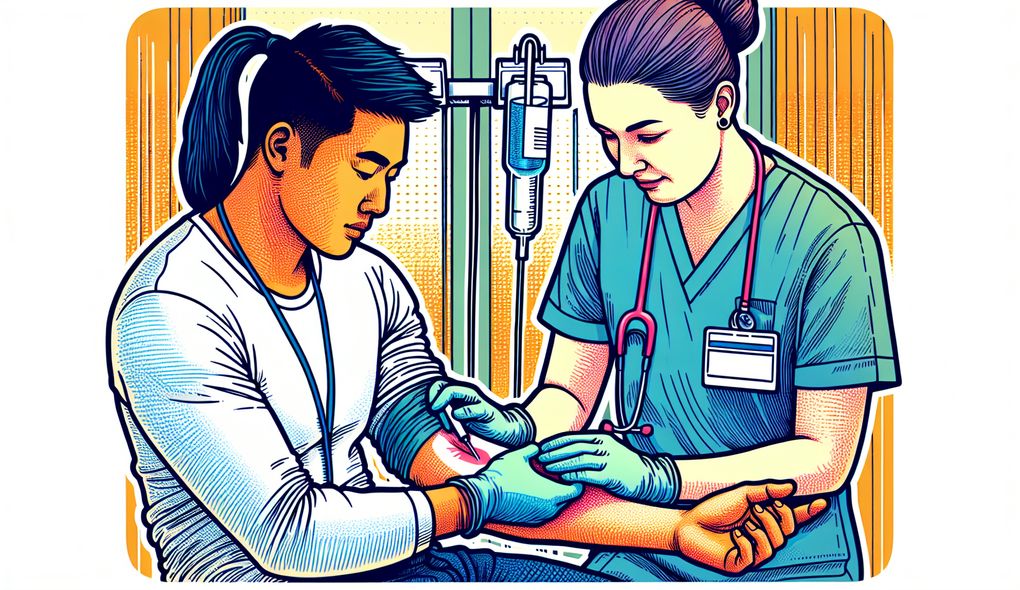Describe a time when you had to utilize evidence-based practice and clinical guidelines to provide optimal wound care.
INTERMEDIATE LEVEL

Sample answer to the question:
One time, I had a patient with a complex diabetic foot ulcer that required optimal wound care. To provide the best care, I utilized evidence-based practice and clinical guidelines. I assessed the wound thoroughly, considering factors like its location, size, and presence of infection. Based on the guidelines, I implemented a care plan that included regular cleansing, debridement, and the use of advanced dressings. Throughout the process, I closely monitored the wound's progress, documenting any changes or complications. I also educated the patient on proper wound care techniques and preventive measures. By following the evidence-based practices and guidelines, I ensured the patient received the most effective treatment for optimal wound healing.
Here is a more solid answer:
During my experience as a wound care specialist, I encountered a challenging case involving a patient with a complex pressure ulcer. To ensure optimal wound care, I relied on evidence-based practice and clinical guidelines. Firstly, I conducted a comprehensive assessment of the wound, considering its size, depth, and surrounding tissue conditions. Based on the guidelines, I developed an individualized care plan that included regular cleansing and debridement, along with the use of advanced dressings specifically designed for pressure ulcers. I monitored the wound closely, documenting the healing progression and any signs of infection. Additionally, I provided detailed education to the patient and their family, emphasizing proper positioning and the importance of regular pressure redistribution. By collaborating with the medical team, including surgeons and nurses, we ensured a holistic approach to the patient's care. As a wound care specialist, I constantly stay updated with the latest clinical guidelines and research, participating in conferences and workshops to enhance my knowledge and skills.
Why is this a more solid answer?
The solid answer provides more specific details about the wound care process, such as the type of wound (pressure ulcer) and the specific care interventions (cleansing, debridement, advanced dressings). The answer also highlights the importance of patient education on wound care and prevention strategies. Furthermore, it emphasizes collaboration with the medical team and continuous learning to stay updated with the latest clinical guidelines. However, it could further improve by including specific outcomes of the wound care intervention and any challenges faced during the process.
An example of a exceptional answer:
In my role as a wound care specialist, I encountered a complex case involving a patient with a chronic venous leg ulcer. To provide optimal care, I relied on evidence-based practice and clinical guidelines, ensuring the best outcomes for the patient. Firstly, I conducted a thorough assessment, evaluating the wound's characteristics, such as size, exudate, and surrounding tissue conditions. Using the guidelines, I developed an individualized care plan that encompassed various evidence-based interventions, including compression therapy, tailored dressings, and regular debridement to promote healing. Throughout the treatment process, I closely monitored the wound's progress, documenting wound measurements, exudate, and signs of infection. By implementing a multidisciplinary approach, I collaborated with vascular surgeons and home healthcare nurses to address underlying risk factors and optimize the patient's healing outcomes. Additionally, I provided comprehensive education to the patient and their family, empowering them to participate actively in their care and prevent future ulcers. To stay abreast of the latest advancements, I regularly attend wound care conferences and engage in continuous learning, translating the latest research into practical clinical applications. This commitment to evidence-based practice enables me to deliver the highest quality wound care, promoting positive patient outcomes and improving their overall quality of life.
Why is this an exceptional answer?
The exceptional answer addresses the question with a highly detailed and specific scenario, showcasing the candidate's extensive knowledge and skills in wound care. The answer includes specific details about the type of wound (chronic venous leg ulcer) and the evidence-based interventions used (compression therapy, tailored dressings, debridement). It also highlights the collaborative approach with other healthcare professionals and the commitment to continuous learning. The answer demonstrates a strong focus on patient education and empowerment. Overall, the exceptional answer showcases a deep understanding of evidence-based practice, clinical guidelines, and their application in wound care.
How to prepare for this question:
- Familiarize yourself with current wound care guidelines, including assessment techniques, treatment options, and preventive measures.
- Reflect on your past experiences in wound care where evidence-based practice and clinical guidelines played a crucial role. Be prepared to discuss specific details, such as the type of wound, interventions used, and outcomes achieved.
- Stay informed about the latest advancements in wound care by attending conferences, workshops, and participating in relevant professional development activities.
- Develop strong documentation and record-keeping skills, as these are essential in providing optimal wound care.
- Highlight your collaboration and communication skills, as wound care often requires working closely with other healthcare professionals and educating patients and their families.
- Discuss your commitment to continuous learning and staying updated with the latest clinical guidelines in wound care.
What are interviewers evaluating with this question?
- strong clinical skills
- knowledge of wound care principles
- use of evidence-based practice and clinical guidelines
- ability to develop individualized care plans
- monitoring and documentation skills
- patient education skills
- collaboration skills
- continuous learning

